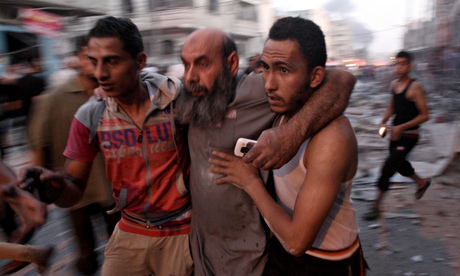Ramadan in Gaza: life under missile-fire
More than 100 have died – often women and children in their own homes – and food prices are rising fast as supplies dry up

Peter Beaumont in Gaza City
The Guardian,

Palestinians flee an air strike on a house in Rafah that killed five people and wounded 15 others on the fourth day of the Israeli military campaign. Photograph: Eyad Al Baba/Anadolu Agency/Getty
In Gaza's largely deserted streets, the first thing you notice is the absence of children.
The beach, usually crowded on Friday afternoons, is empty save for a handful of fishermen casting hand nets into the surf next to the harbour wall.
Al-Azhar park – next to the university of the same name – and Barcelona park with its climbing frames, lawns and basketball courts, are empty.
The few children who are outside play in the sheltered spaces between tall apartment blocks and the narrow lanes of the poorer neighbourhoods, a few feet from their doors under the watchful eyes of their parents: places deemed safer from bomb blasts.
It is the fourth day of Israel's intensive bombing campaign of the Gaza Strip, and more than 100 Palestinians have been killed, many of them children. More than 670 are injured. Families here have settled into a tense wartime regime, a daily routine hard-learned from Israel's previous military campaigns of 2008-09 and 2012.
Unlike Israel, there are no bomb shelters in Gaza. There are no sirens to warn of incoming missiles and no Iron Dome to shoot them down. The only warning, and one provided only intermittently, is that from those dropping the bombs – supplied by phone, text or a warning shot to the roof.
Under the ever-present hum of circling drones, squeal of jets, bomb-blasts and the thud of naval gunfire from the sea, most women and children are stuck indoors, often in buildings without electricity.
These families have been caught in a tragic catch-22. Afraid to leave their homes when the Israeli warplanes do drop their bombs on Gaza's neighbourhoods, it is the women and children sheltering in the buildings where they instinctively feel safest who are dying.
Israel has said it is training its missiles on Gaza's homes – a practice the United Nations Human Rights Office says may violate international law – because Hamas and other militants are hiding inside.
"We have received disturbing reports that many of the civilian casualties, including of children, occurred as a result of strikes on homes," Ravina Shamdasani, a UN spokeswoman said on Thursday. "Such reports raise doubts about whether the Israeli air strikes have been in accordance with international humanitarian law and international human rights law."
The Israeli prime minister, Binyamin Netanyahu, has rejected the criticism of international and local human rights groups and vowed to continue with the campaign. "No international pressure will prevent Israel from continuing its operation in Gaza … The leaders of Hamas are hiding behind the citizens of Gaza, and they are responsible for all casualties," he said.
For the 1.8 million people living in Gaza, this means that long Ramadan days – from before dawn until the late bedtime traditional during the fasting month – will continue to be defined by limited exposure to the open air.
Gaza City's central Firas market is usually packed with shoppers shoulder to shoulder, looking for fruit and vegetables after noon prayers. This Friday a few people were bustling along its lanes. Hamdi Haboush, 63, sat outside the hardware store where he sells brush heads and squeegees, spice racks and spades. "I haven't had any customers at all today," he said. "I only opened because I couldn't bear staying in the house. There are 50 of my family in our building, including twenty grandchildren.
"It's only really me who is going to early prayers at the moment [at four in the morning]. But it's the most frightening time for bombs so I walk close to the walls on my way to mosque.
"Otherwise no-one is going out. There's no work and nothing to do. Nowhere safe to go. Everyone is in a state of panic wondering when a bomb will fall.
"We have two metres square of space where the younger children can play. Last night some of the grandchildren came to me and said: 'Why are you going to open your shop? It's scary.' But I have to come out to change my mood."
Other men standing or sitting by their empty shops and stalls said the same. There is no money to be made – only relief from households going "crazy".
If, as Haboush says, early morning prayers are quiet, a steady stream of men and older boys filed in to the main mosque in Radwan for Friday prayers.
Mahmoud Karazem, 30, arrived late and in a hurry. He has grown used to the bombs over the years and different campaigns: "It's normal." Life under advanced missile-fire is not yet normal for his wife and two young toddlers.
"My wife is at home with the children. They are one and a half and almost three. I try to reassure them but when a bomb explodes it bursts the bubble. I cuddle them to get them used it, but sometimes it doesn't work."
The imam began his sermon with a message to worshippers that they were engaged in a fight of "good against evil". Ramadan "is a time of victories" he said before condemning the complicity of America and the international community and "the silence of the Arab world".
Mahmoud Khalija went to buy groceries after midday prayers. A worker at Gaza City's Shifa hospital, he said he is attempting to go about his life as "normally as possible".
"My wife is going to work too," he said. "Our older children stay at home with the youngest. The prices are the biggest problem. There is no fish," he added, indicating a shuttered fish stall. "And because it is so hard for the farmers to harvest and bring their produce to the market, some prices have quadrupled."
Others who had ventured out explained the judgment call: roads exposed to the sea, and therefore to Israel's naval gunships, are to be avoided. Roads bordering farmland where rockets are launched, are driven through quickly, if at all.
In Gaza, wealth cannot inoculate you from fear. In affluent neighbourhoods, where the buildings are taller and more widely spaced, the sound of the dropping missiles rings more loudly and clearly than in the huddled, poorer neighbourhoods and refugee camps. They are also closer to the naval boats pounding the coast with artillery fire.
In Tal al-Hawa, a neighbourhood hit hard in the 2008-09 conflict, Hazem Farwana, 38, a baker, is making Ramadan pancakes. He and his son Samir, 12, sell them for a £1.50 a kilo from a stall in front of a falafel takeaway.
Pancakes are the treat of any Iftar meal at the end of a day of fasting. They are served with nuts, cheese or dates and normally eaten before families go out visiting, sitting up late into the night. But Farwana and his wife have not gone visiting this week: "We are not living a normal life.
"People are stuck indoors. All they can do is eat. I have four children under 16 – I won't let them go too far from home."
As he spoke, a bomb exploded in the distance, close enough for a shockwave to rattle the window frames overhead.
Suddenly philosophical, Farwana added: "If I am going to die then I will die. I can die in the open as easily as I can indoors."
No comments:
Post a Comment